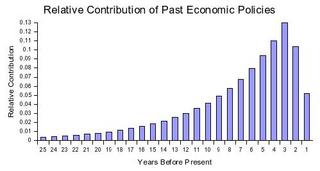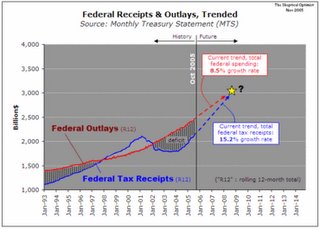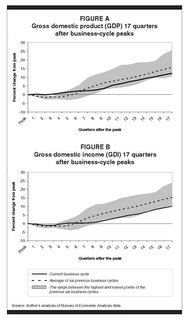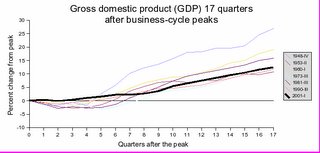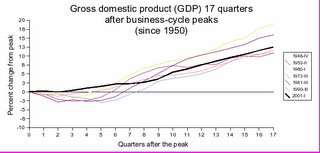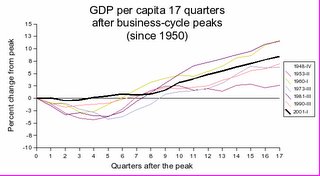Howard recently
posted "A Perspective On Where We Are" that describes the importance of "extended order of cooperation" from a very high level, big picture perspective. He excerpted the following statement from an
article from The American Enterprise:
What generates economic growth, more business creation and more jobs are lower taxes, less central planning and less government, as unambiguously demonstrated by country-by-country analyses and by the widely divergent growth rates within the United States between the different states.
Whereas I couldn't agree more with this statement, it's clear to me that if someone hasn't extensively studied markets and economic frameworks, it would require a huge leap of faith to buy into such a statement. So I'm going to try and come down a little closer to earth from the stratosphere of economic thought and give one small concrete example of why lower taxes do actually create more jobs, and as a side benefit, create wealth for the less skilled in our society.
Our story starts at the Home Depot. Most free-market champions laud places like home depot as an example of how the spontaneous economic order creates tens of thousands of different types of products, automatically adapting to the needs and desires of do-it-yourselfers. And yes, I also am amazed at the diversity of products at the Depot. It's the story
I Pencil repeated hundreds of thousands of times.
But there's another interesting story about the Depot that's generally unnoticed and that's the fact that the existence of all these do-it-yourselfers is evidence of too much taxation. I was there just the other day which is why I'm thinking about it. Many of the customers' cars in Home Depot's parking lots are quite nice: BMWs, Mercedes, Infinitis, and so forth. On my way out, I noticed a guy loading about 100 feet of copper pipe into his Lexus SUV. A Lexus SUV costs more than $40,000, so chances are he gets paid a lot for his work.
So why was this guy doing his own plumbing? Why didn't he just hire a plumber to do the work? For sure, some people might actually like to do plumbing, though I have a hunch that plumbing isn't a favorite hobby for the do-it-yourselfer. I do my own plumbing (at least on the intake end) and it's dirty, greasy, and hot and you often have to crawl into or at least work in tight spaces. So while it may not be true in this instance, let's assume that this do-it-yourselfer had an economic incentive to do so.
I didn't actually talk to the guy, so I'll have to make some other assumptions as well. Let's assume this guy was an independent software contractor who makes $100 per hour. That's probably a high enough rate to support owning a Lexus SUV. Let's also assume that this guy can get as much work as he likes at $100 per hour and that he likes his work at least as much as he like plumbing. In addition, assume that he could have hired a plumber at $80 per hour and that the plumber could do the work 25% faster.
Given that there was 100 feet of pipe involved, I'd imagine that it would take about a day (8 hours) to layout and solder all that pipe. The plumber being 25% faster would therefore take 6 hours and would charge $480 (6 hours times $80 per hour) for the work.
So it might seem that the software guy would be economically better off if he simply worked at software for an additional 8 hours to make an additional $800 and then pay the plumber $480 to do the plumbing as opposed to working those 8 hours soldering the copper pipes himself. It seems like he would be $320 dollars ahead ($800 - $480) for working the exact same number of hours.
However, we haven't yet taken into account transaction costs. First the software guy has to find the plumber. Then he has to meet him and get a bid or estimate. Perhaps he has to let the plumber inside the house one or more times. When the plumber is done he has to write him a check. Let's estimate that these activities take the software guy two hours. Taking this new information into account, of the eight hours that it would take the software guy to do his own plumbing, two hours are allocated to dealing with the plumber, which leaves only six hours to writing software. So now it's only $600 dollars extra that the software guy makes writing software minus the $480 that's paid to the plumber. But he's still $120 ahead.
But wait a minute. The software guy also has to pay taxes on that $600. Since he lives in California (that's where this Home Depot is that I'm talking about), he pays 9.3% of state income tax on those marginal dollars earned and 35% federal income tax. Because of the Alternate Minimum Tax, only some of his state taxes can be deducted from his federal taxes, so assume that he loses about $40 dollars of each $100 dollars he's paid per hour.
Now, of that extra $600 he was paid for those six extra hours writing software instead of plumbing, he pays $240 in taxes, leaving him only $360. But he still owes the plumber $480, so it turns out, that because of taxes, he's better off doing his own plumbing.
Let's quickly consider the economics of the situation. With lower taxes, the software guy would work writing software for an extra six hours and pay a plumber for six hours of work. With taxes as they are, the software guy spends the time plumbing, and the plumber spends the time doing nothing. So our economy loses about six plumber hours of wealth because of this one transaction (or lack thereof). Note that the software guy's time spent writing software is what's called "market time" (he's selling his services to the market) and is counted as part of GDP. His time spent plumbing is called "non-market time" (he's doing something for himself) and is not counted as part of GDP.
But the economic loss itself is secondary to a more important problem in my opinion. In such a situation, it's always the less well paid person who loses out more. The software guy ends up with $480 worth of plumbing for an effective rate of $60 per hour
after taxes, which is about the same as his marginal hourly rate after taxes. He worked at plumbing for eight hours and has created an additional $480 more wealth for himself. But the plumber lost a $480 opportunity. Because of situations like this there are less opportunities for plumbers and therefore less plumbers. Those individuals who might have been $80 per hour plumbers need to find some other, lower paying line of work.
This sort of situation can be part of long chain. A doctor writes his own will instead of hiring a lawyer who does her own books instead of hiring the accountant who writes her own customer database program instead of hiring our software consultant who does his own plumbing instead of hiring the aforementioned plumber who fixes his own washing machine instead of hiring a washing machine repairman who builds his own kitchen cabinets instead of hiring a cabinet maker who does his own landscape maintenance instead of hiring a gardener who doesn't do anything because he can't get work.
At each stage in the process, the reduced opportunity due to tax burden ends up affecting the less well off individual more than the better paid person. There would be more and better paying jobs at the lower end of the scale if taxes at the higher end were lower. This is one of the many reasons why lower taxes create more jobs and create wealth for the less skilled in our society.
Category: cat_taxes
